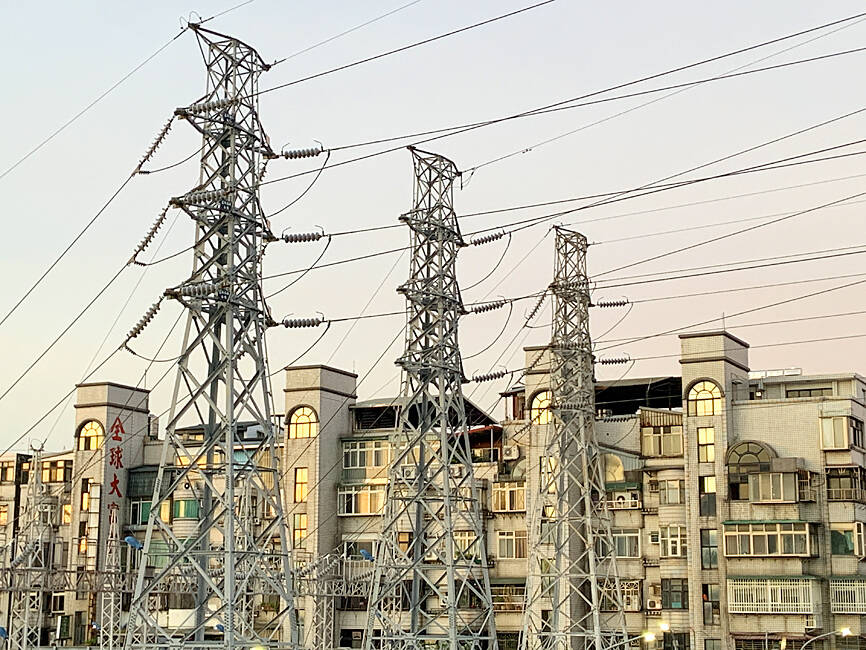Power consumption by industrial sectors last month declined from a year earlier, indicating that the business expansion cycle for the semiconductor industry has plateaued and could head toward a slowdown, the Taiwan Research Institute (台灣綜合研究院) said yesterday.
The electricity prosperity index (EPI), which the institute uses to gauge the health of industrial sectors, showed that energy consumption shrank 0.29 percent from a year earlier, the New Taipei City-based institute said.
The reading for heavy industrial users decreased 2.25 percent as global demand for electronics is losing momentum, it said, urging policymakers to heed the economic implications.

Photo: Tu Chien-jung, Taipei Times
Taiwan supplies 60 percent of the chips used in high-performance computing, laptops, big data analysis, automobiles and Internet of Things applications.
Global demand for advanced and mature chips remains strong in light of a double-digit percentage increase in power consumption among fabs, but sales of other semiconductor products are floundering, it said.
It is the third straight month the EPI has flashed a “flat” climate signal, meaning the boom in the semiconductor sector might have peaked and companies should plan for a slowdown ahead, the institute said.
The US, the largest end-market for consumer electronics, slipped into a technical recession in the first half, while strict COVID-19 controls are constraining economic activity in China. Together, the two markets account for more than 50 percent of Taiwan’s exports.
Electricity usage by non-technology manufacturers also displayed a negative cyclical movement and the technology sectors could not rescue the situation as they did last year.
Inflationary pressures are taking a toll on demand for base metals, and plastic and chemical products, the institute said.
Electricity generated via combined heat and power systems in June slumped 17.7 percent, the worst retreat in history, as suppliers purchased energy directly from state-run Taiwan Power Co (台電) to cope with spiking power generation costs, it said.
The EPI reading and softening export orders lent support to the forecast of an economic slowdown, but power consumption among service providers such as retailers, restaurants, hotels and recreational facilities increased 13.26 percent year-on-year, as people resumed gathering and dining out despite the lingering domestic COVID-19 outbreak, the institute said.
The institute earlier predicted that the nation’s economy expanded 3.3 percent in the first half of the year, weaker than the government’s 3.38 percent forecast.

GROWING OWINGS: While Luxembourg and China swapped the top three spots, the US continued to be the largest exposure for Taiwan for the 41st consecutive quarter The US remained the largest debtor nation to Taiwan’s banking sector for the 41st consecutive quarter at the end of September, after local banks’ exposure to the US market rose more than 2 percent from three months earlier, the central bank said. Exposure to the US increased to US$198.896 billion, up US$4.026 billion, or 2.07 percent, from US$194.87 billion in the previous quarter, data released by the central bank showed on Friday. Of the increase, about US$1.4 billion came from banks’ investments in securitized products and interbank loans in the US, while another US$2.6 billion stemmed from trust assets, including mutual funds,

Micron Memory Taiwan Co (台灣美光), a subsidiary of US memorychip maker Micron Technology Inc, has been granted a NT$4.7 billion (US$149.5 million) subsidy under the Ministry of Economic Affairs A+ Corporate Innovation and R&D Enhancement program, the ministry said yesterday. The US memorychip maker’s program aims to back the development of high-performance and high-bandwidth memory chips with a total budget of NT$11.75 billion, the ministry said. Aside from the government funding, Micron is to inject the remaining investment of NT$7.06 billion as the company applied to participate the government’s Global Innovation Partnership Program to deepen technology cooperation, a ministry official told the

Taiwan Semiconductor Manufacturing Co (TSMC, 台積電), the world’s leading advanced chipmaker, officially began volume production of its 2-nanometer chips in the fourth quarter of this year, according to a recent update on the company’s Web site. The low-key announcement confirms that TSMC, the go-to chipmaker for artificial intelligence (AI) hardware providers Nvidia Corp and iPhone maker Apple Inc, met its original roadmap for the next-generation technology. Production is currently centered at Fab 22 in Kaohsiung, utilizing the company’s first-generation nanosheet transistor technology. The new architecture achieves “full-node strides in performance and power consumption,” TSMC said. The company described the 2nm process as

JOINT EFFORTS: MediaTek would partner with Denso to develop custom chips to support the car-part specialist company’s driver-assist systems in an expanding market MediaTek Inc (聯發科), the world’s largest mobile phone chip designer, yesterday said it is working closely with Japan’s Denso Corp to build a custom automotive system-on-chip (SoC) solution tailored for advanced driver-assistance systems and cockpit systems, adding another customer to its new application-specific IC (ASIC) business. This effort merges Denso’s automotive-grade safety expertise and deep vehicle integration with MediaTek’s technologies cultivated through the development of Media- Tek’s Dimensity AX, leveraging efficient, high-performance SoCs and artificial intelligence (AI) capabilities to offer a scalable, production-ready platform for next-generation driver assistance, the company said in a statement yesterday. “Through this collaboration, we are bringing two